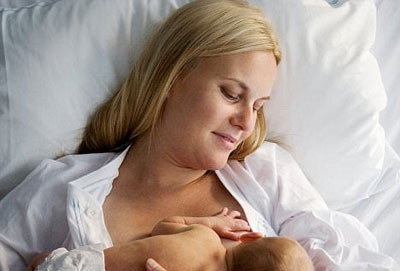|
 Breastfeeding is recommended for the first six months of a baby's life. |
|
Every mother who returns to work full-time must be allowed ‘breastfeeding breaks’ of up to two hours each day, according to the latest rules from Brussels. Under proposals being considered by MEPs, mothers would also be given the right to work part-time for a year after having a baby, and be entitled to 20 weeks’ maternity leave on full pay. The British Chambers of Commerce warned the measures could cost the Government £2.5billion, and ‘risk the position of women in the workplace’. It warned taxes would have to rise to cover the extra costs, such as hiking VAT even higher to 20.5 percent. Under the proposals, buried in Europe’s Pregnant Workers’ Directive, with which Britain would be legally obliged to comply if passed: * Every mother who returns to work full-time must be allowed ‘breastfeeding breaks’ of two hours every day. There is no cap on these breaks, which means they could continue for years if the woman decides to breastfeed beyond the traditional period. * Mothers will have an ‘absolute right’ to a flexible job and will be entitled to work part-time for up to one year after they return to work. * No boss will be able to force a woman to do a night shift or overtime in the ten weeks before her baby is born or during the breastfeeding period. * Mothers will get full pay for the first 20 weeks of maternity leave. They currently get 90 percent of their salary for six weeks, followed by £128.73 a week for the next 33 weeks. * It will also be compulsory to have at least six weeks off after giving birth, compared with two at the moment. * Fathers would see paternity pay increased to two weeks’ on full pay. At present, they receive £128.73 a week for a fortnight. British mothers returning to work can currently ask to work flexibly but a boss has the right to refuse if there is a clear business reason why it is not possible. Phil McCabe, from the Forum of Private Business, said: ‘Business do want to accommodate mothers but such extreme measures would make it increasingly difficult for small firms. They are mad. There is a risk it would put off some business owners from employing women of child-bearing age.’ (Read by Christine Mallari. Christine Mallari is a journalist at the China Daily Website.) (Agencies) |
根据位于布鲁塞尔的欧盟订立的新规定,每位休完产假回来全职工作的母亲每天都必须有两小时的哺乳假。 经欧洲议会成员考虑的这些提议指出,母亲们还应享受产后一年内非全日工作的权利,而且应享受20周的全薪产假。 英国商会警告说,这些措施将花费政府25亿资金,并将使“女性在职场中的地位陷入危险”。 商务部警告说,为了负担额外的开支,将不得不提高税收,例如将已经很高的增值税调得更高,调至20.5%。 如果这些规定通过,英国将有法律义务遵循欧洲的“怀孕工人指令”的以下条款: * 必须给予每位产后重回职场进行全职工作的母亲每天两小时的“哺乳假”。 休哺乳假的时间没有上限,这意味着只要女性在传统哺乳期结束后仍决定用母乳喂养小孩,她们就能够连续好几年休哺乳假。 * 母亲们将拥有弹性工作时间的“绝对权”,在回归职场后一年内她们将能享受非全日工作的权利。 * 在孩子出生10周前和哺乳期间,任何一位上司都不能强迫女性去值夜班或加班。 * 在产假的头20周内母亲们将能享受全薪待遇。目前她们在产假的前6周能得到90%的薪水,在随后的33周每周的薪水是128.73英镑。 * 在生产后,母亲们将至少必须休6周产假,而目前这一强制性产假为2周。 * 父亲们将能享受更多的产假工资,全薪产假为两周。目前他们在两周产假内每周的薪水是128.73英镑。 回归职场的英国母亲们现在可以提出弹性工作时间的请求,但是如果有明确的业务原因使其无法实现,上司有权拒绝这一请求。 来自私营企业论坛的菲尔•麦卡比说:“企业们当然想为母亲们提供方便,但这种极端的措施会让小公司们度日维艰。他们很恼火。出台这些政策简直是疯了。而且这可能会让一些企业主不愿雇佣育龄妇女。” 相关阅读 (中国日报网英语点津 陈丹妮 编辑:冯明惠) |
|
Vocabulary: MEP: Member of the European Parliament 欧洲议会成员 entitled to: 有权享有 maternity leave: 产假 hike: (尤指急剧地)提高(物价等) VAT: value-added tax 增值税 cap: <美>(经费等的)最高限度 compulsory: 必须做的,强制性的 fortnight: 两星期 accommodate: 给……方便;通融 put off: 阻碍 |
